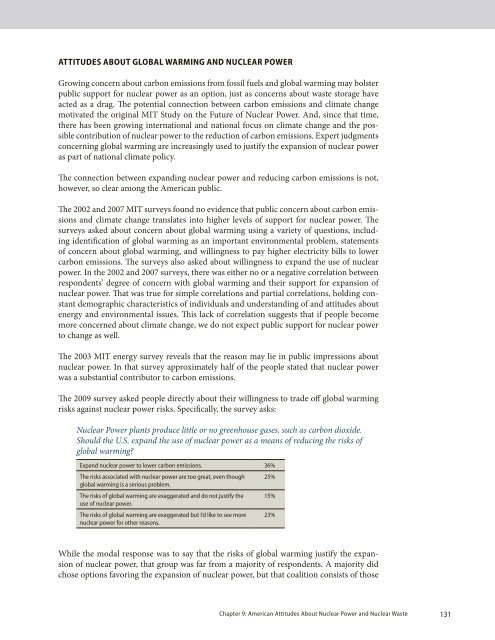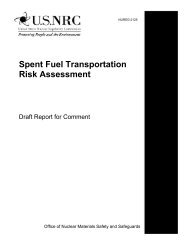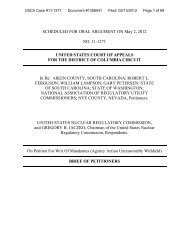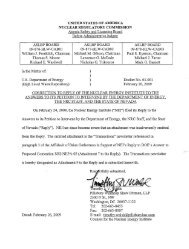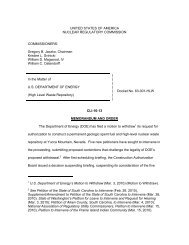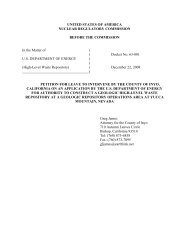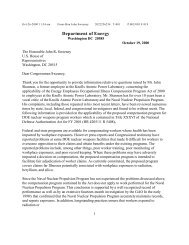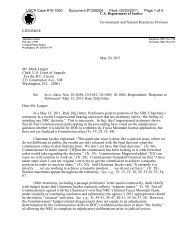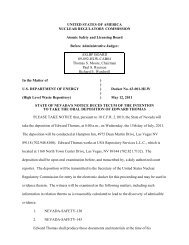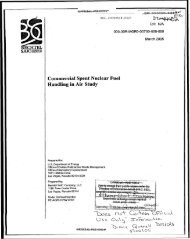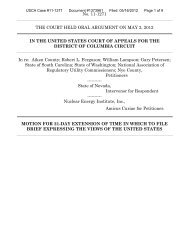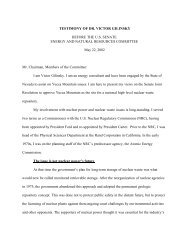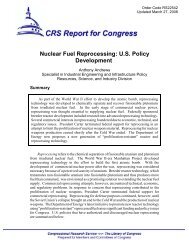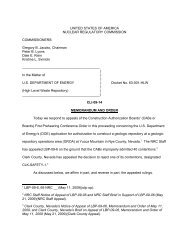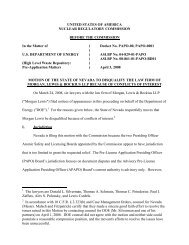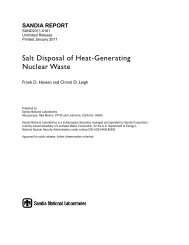The FuTure oF nuclear Fuel cycle - MIT Energy Initiative
The FuTure oF nuclear Fuel cycle - MIT Energy Initiative
The FuTure oF nuclear Fuel cycle - MIT Energy Initiative
Create successful ePaper yourself
Turn your PDF publications into a flip-book with our unique Google optimized e-Paper software.
attitudeS about Global WarminG and nuClear poWer<br />
Growing concern about carbon emissions from fossil fuels and global warming may bolster<br />
public support for <strong>nuclear</strong> power as an option, just as concerns about waste storage have<br />
acted as a drag. <strong>The</strong> potential connection between carbon emissions and climate change<br />
motivated the original <strong>MIT</strong> Study on the Future of Nuclear Power. And, since that time,<br />
there has been growing international and national focus on climate change and the possible<br />
contribution of <strong>nuclear</strong> power to the reduction of carbon emissions. Expert judgments<br />
concerning global warming are increasingly used to justify the expansion of <strong>nuclear</strong> power<br />
as part of national climate policy.<br />
<strong>The</strong> connection between expanding <strong>nuclear</strong> power and reducing carbon emissions is not,<br />
however, so clear among the American public.<br />
<strong>The</strong> 2002 and 2007 <strong>MIT</strong> surveys found no evidence that public concern about carbon emissions<br />
and climate change translates into higher levels of support for <strong>nuclear</strong> power. <strong>The</strong><br />
surveys asked about concern about global warming using a variety of questions, including<br />
identification of global warming as an important environmental problem, statements<br />
of concern about global warming, and willingness to pay higher electricity bills to lower<br />
carbon emissions. <strong>The</strong> surveys also asked about willingness to expand the use of <strong>nuclear</strong><br />
power. In the 2002 and 2007 surveys, there was either no or a negative correlation between<br />
respondents’ degree of concern with global warming and their support for expansion of<br />
<strong>nuclear</strong> power. That was true for simple correlations and partial correlations, holding constant<br />
demographic characteristics of individuals and understanding of and attitudes about<br />
energy and environmental issues. This lack of correlation suggests that if people become<br />
more concerned about climate change, we do not expect public support for <strong>nuclear</strong> power<br />
to change as well.<br />
<strong>The</strong> 2003 <strong>MIT</strong> energy survey reveals that the reason may lie in public impressions about<br />
<strong>nuclear</strong> power. In that survey approximately half of the people stated that <strong>nuclear</strong> power<br />
was a substantial contributor to carbon emissions.<br />
<strong>The</strong> 2009 survey asked people directly about their willingness to trade off global warming<br />
risks against <strong>nuclear</strong> power risks. Specifically, the survey asks:<br />
Nuclear Power plants produce little or no greenhouse gases, such as carbon dioxide.<br />
Should the U.S. expand the use of <strong>nuclear</strong> power as a means of reducing the risks of<br />
global warming?<br />
expand <strong>nuclear</strong> power to lower carbon emissions. 36%<br />
<strong>The</strong> risks associated with <strong>nuclear</strong> power are too great, even though 25%<br />
global warming is a serious problem.<br />
<strong>The</strong> risks of global warming are exaggerated and do not justify the 15%<br />
use of <strong>nuclear</strong> power.<br />
<strong>The</strong> risks of global warming are exaggerated but I’d like to see more 23%<br />
<strong>nuclear</strong> power for other reasons.<br />
While the modal response was to say that the risks of global warming justify the expansion<br />
of <strong>nuclear</strong> power, that group was far from a majority of respondents. A majority did<br />
chose options favoring the expansion of <strong>nuclear</strong> power, but that coalition consists of those<br />
chapter 9: american attitudes about <strong>nuclear</strong> Power and <strong>nuclear</strong> Waste 131


